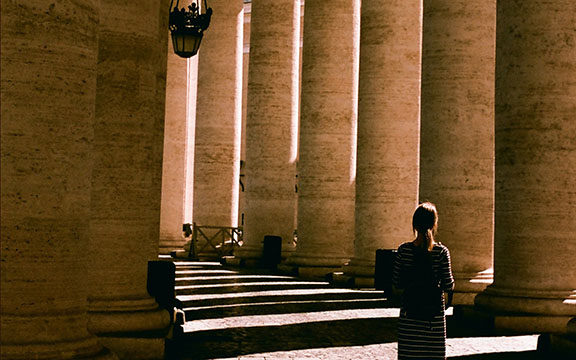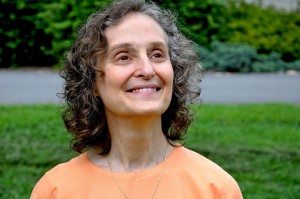
Photo by Matt Hardy from Pexels
Most of you will probably recognize the following prayer by St. Francis of Assisi. As you read it, let the words enter your heart. Take a moment to reflect on how you could apply it both outwardly to others and inwardly toward yourself.
Prayer of Saint Francis of Assisi
Lord, make me an instrument of your peace.
Where there is hatred let me sow love;
Where there is injury, pardon;
Where there is doubt, faith;
Where there is despair, hope;
Where there is darkness, light;
Where there is sadness, joy.
O Divine Master, grant that I may not so much seek
To be consoled as to console;
To be understood as to understand;
To be loved as to love.
For it is in giving that we receive;
It is in pardoning that we are pardoned;
And it is in dying that we are born to eternal life.
This prayer is an expression of what in the Hindu tradition is called Sanatana Dharma, the eternal truth. It is true for all times and places, all cultures and nations, irrespective of one’s politics, philosophy or religion. It encapsulates, expresses in a nutshell, the essence of the major paths of Yoga: Karma, Bhakti, Jnana and Raja — service, love and wisdom. It is a pure and powerful application of a key practice in Raja Yoga, called Pratipaksha Bhavana, in which we overcome something negative by cultivating the opposite positive.
It is a prayer of healing, inclusivity and equality. It is a call to the soul to lead a truly holy life and offers a pathway to the highest spiritual realization. It is as relevant today as when it was first uttered — a formula for dealing with the seemingly overwhelming challenges facing every individual in the global community today. As the new year approaches, if you are contemplating making some resolutions, you need look no further than one of these exhortations. They can serve as an anchor during the current storm, as well as a guiding light for a lifetime.
Lord, make me an instrument of your peace.
God resides in the sanctuary of our hearts in the form of peace. The mind is like a lake. Thoughts are like waves. When we still the thoughts, we can see to the bottom of the lake, to the very depths of our being, and experience that supreme peace within us. Daily meditation, practiced regularly over time, will enable us to experience that peace. Try to have at least two sittings daily, working up to thirty minutes each. Good times for meditation are first thing when you arise in the morning and last thing before you retire at night. It is also very beneficial to sit at the junctures, or transitions, of the day when sattva, or purity, prevails in the atmosphere: before dawn, at noon, and at dusk.
To be an instrument of peace, we also need to bring that peace into our lives. Even if we don’t feel peaceful at times, we can choose peace in our interactions. We can set the intention of fostering peace in all that we do. In tense situations, we can pause, breathe, and carefully select our words. When there are difficult decisions to be made, we can check our motives and reflect on the consequences before acting. If all of us committed to choosing peace above all else, our combined soul-force would have a significant impact on our families, friends, neighbors, community and the world.
Where there is hatred let me sow love.

Photo by Диана Дунаева from Pexels
The Holy Bible states: “You shall love the Lord your God with all your heart, with all your soul and with all your mind. This is the first and greatest commandment. And the second is like it: Love your neighbor as yourself. All the Law and the Prophets hang on these two commandments.” This means that everything depends on our connection, attunement, and coming into right relationship with the Higher Power, (which is none other than our own true Self), and with one another. This entails reverence, respect, kindness and love.
There is no greater force than love — to heal broken hearts, to restore broken lives, to reignite the will to persevere in the face of hardships. It is a basic human need to feel cherished and valued, to feel that one is truly seen and understood, and that one’s life has meaning and purpose. Not only can we offer this to one another; it’s part of our dharma, our duty, to do so. We are an interdependent species; our existence depends on mutual support. As the poet John Donne said, “No man is an island entire of itself; every man is a part of the continent … any man’s death diminishes me because I am involved in mankind.”
Our collective humanity needs the healing grace of love. We can choose love in our interactions with people, with our pets, plants, and possessions. A gentle touch, a kind word, a thoughtful smile, an unexpected check-in call — can change a day, can save a life. Mother Teresa said: “Not all of us can do great things. But we can do small things with great love.” The quality of a life is not determined by rare heroic feats, but by how we meet each moment. We can strive to do so consciously, mindfully and lovingly.
There is a Zen saying: “The way we do anything is the way we do everything.” Consider that the next time you prepare a meal, or answer the phone, or drive your car, or clean your home. Do you move through life carefully, patiently and lovingly? Or do you often find yourself rushed, scattered, or frustrated? The entirety of who we are is reflected in every little thing we do. If you really look closely as you move through just one activity, you will learn volumes about yourself and where improvement may be needed.
Many years ago in Europe, there lived a holy rabbi. Along with the local villagers, a man who lived a great distance away, would always come to the rabbi’s service. He would quietly attend and then depart for home.
In the fullness of time, the rabbi’s life came to an end. The man who had traveled every week to see him came to the funeral. When the rites were completed, the other congregants surrounded him and inquired: “In all these years, come rain or shine, no matter what may have been happening in your personal life, you never missed the rabbi’s service. What drew you to him? Was it his reading of the Torah or his brilliant discourses; did he give you special guidance? With tears in his eyes, the man humbly replied, “I came to watch him tie his shoes.” The greatness and holiness of the rabbi were fully revealed in the simplest of acts that he performed.
Where there is injury, pardon.
Each one of us is a “work in process.” Swami Satchidananda used to refer to the universe as a universe-ity. We are here to learn, to grow and evolve, and this means that we will make mistakes. Without forgiveness, we would all be caught in endless karmic webs of suffering, devoid of redemption. Forgiveness provides a pathway to salvation for both the giver and the recipient.

Photo by Rodnae Productions from Pexels
The prayer states: “It is in pardoning that we are pardoned.” The Holy Bible puts it this way: “Forgive us our trespasses as we forgive those who trespass against us.” This can be understood if you picture a funnel that is being used to transfer honey from a greater source to another vessel. The funnel, too, gets the sweetness. Likewise, when we forgive others, the spirit of forgiveness flows through us, and we, too, are forgiven.
There is a saying: “To err is human, to forgive is divine.” Forgiveness involves rising above ordinary patterns of reactivity, divesting ourselves of stories we may have been telling ourselves for years and attitudes that no longer serve our higher good. It can flow spontaneously as a dispensation of divine grace or it can be offered deliberately as an act of choice. It is the letting go of anger or resentment even if the situation seems to warrant it and giving instead the gifts of mercy, generosity, and love.
If we don’t forgive, the hurts we experienced in the past continue to have power over us in the present. As we stand on the cusp of a new year*, we can make it a new beginning. Consider what you wish to retain and remember, and what you wish to release, to forgive and forget.
You may wonder, “How is it possible to forget when someone has wronged you?” There was once a spiritual teacher, who as a boy, had a classmate that treated him very cruelly. Years later, the former classmate came to visit the teacher and was received with much kindness. After a while, overcome by the love and gentleness of the teacher, the former classmate asked: “Don’t you remember how badly I treated you when we were boys?” And the teacher replied, “I distinctly remember forgetting it!”
Mahatma Gandhi was once asked how he could put up with all the injustice and cruelty in the world. He responded: “I’m such a scoundrel myself, I have compassion for the other scoundrels in the world.” When we think of all the failings and weaknesses we may have, all the mistakes we have made, shouldn’t that inspire us to be more compassionate and forgiving toward others? The Tao Te Ching states: “Mercy is the means by which heaven saves and guards.” Forgiveness, mercy and grace are what ultimately set us free.
Where there is doubt, faith;
Where there is despair, hope;
Where there is darkness, light;
Where there is sadness, joy.
Together, we are on a path of unknowing, uncertain as to what each day might bring. Faith can be understood as an acronym for Fear Absent In The Heart. No matter what may come, girded by faith, we can face it with courage and inner strength.
Hope is a Light that will sustain us through the darkness. Standing before a turbulent river, one can easily give way to despair. But when others link arms with us, ready to face the rocky waters alongside us, hope is restored and the impossible becomes doable. For certain, this period in our shared journey shall pass: the turbulent waters will settle; the elements will come back into balance; harmony will be restored.
St. Frances de Sales one noted that “A sad saint is a sad saint indeed.” In the coming year, we can all make renewed efforts to bring some laughter and lightheartedness into one another’s lives. The Tirukkural, a holy scripture from South India, enjoins us to “Laugh when a calamity comes upon you. There is nothing like laughter for overcoming it.”
As we embark on yet another unpredictable year, we have the power to choose how we will meet it. Whereas external circumstances may not be under our control, our attitude toward them is. We can choose peace; we can choose love; we can choose mercy and forgiveness. We can affirm our faith, keep the light of hope burning bright, and find joy in the blessings big and small that come our way. We can greet each day with gratitude for the gift of life, of breath, of nourishment, of family and friends. In some subtle way, our souls have chosen to be here, now, to undergo this experience. Let’s make the most of it, inwardly and outwardly, for the benefit of one and all.
For it is in giving that we receive;
And it is in dying that we are born to eternal life.
In the culmination of the prayer, St. Francis reflects the signature teaching of Sri Swami Satchidananda and the guiding principle for Satchidananda Ashram–Yogaville. The yogic version comes from the Bhagavad Gita, where the Sanskrit states: Tyagat Shantir Anantaram. Swami Satchidananda interpreted this to mean: “The dedicated ever enjoy supreme peace. Therefore, live only to serve.”
In yogic terms, we would say that a dedicated life is one of selfless service, giving without expecting anything in return, as an instrument in the hands of the Divine. By renouncing selfish desire, we die to the promptings of the lower egoistic self and awaken to our true nature — the ever-blissful, peaceful, eternal Spirit within.
May the Light shine ever brighter in the coming year. Wishing you all health and happiness, peace and prosperity, fun and fulfillment, in the days, weeks, and months to come as, together, we make another trip around the sun. Om shanti shanti shanti. May peace be unto all.
About the Author:
 Swami Karunananda is a senior disciple of Sri Swami Satchidananda. In 1975, she was ordained as a monk into the Holy Order of Sannyas. She has had almost 50 years experience teaching all aspects of Yoga and specializes now in workshops, retreats, and teacher training programs that focus on the science of meditation, the philosophy of Yoga, personal transformation, and Yoga breathing techniques for better health and well-being. She developed, and for 30 years has taught, the Integral Yoga Teacher Training programs in Raja Yoga and in Meditation.
Swami Karunananda is a senior disciple of Sri Swami Satchidananda. In 1975, she was ordained as a monk into the Holy Order of Sannyas. She has had almost 50 years experience teaching all aspects of Yoga and specializes now in workshops, retreats, and teacher training programs that focus on the science of meditation, the philosophy of Yoga, personal transformation, and Yoga breathing techniques for better health and well-being. She developed, and for 30 years has taught, the Integral Yoga Teacher Training programs in Raja Yoga and in Meditation.
Swami Karunananda served as president of Satchidananda Ashram–Yogaville in Virginia and in California, as well as director of the Integral Yoga Institutes in San Francisco and in Santa Barbara. She currently serves on the Board of Trustees, and as the chairperson of the Spiritual Life Board at Satchidananda Ashram–Yogaville, Virginia. Interested in fostering interfaith understanding and harmony, she is featured in the interfaith documentary entitled, “With One Voice.” She also compiled and edited the Lotus Prayer Book, a collection of prayers from various faith traditions, and Enlightening Tales as told by Sri Swami Satchidananda. She served as contributing editor for The Breath of Life: Integral Yoga Pranayama, as well as a senior writer for the Integral Yoga Magazine. In her book, Awakening: Aspiration to Realization Through Integral Yoga, she describes the spiritual path and provides guidance for the journey.
*Article is from a talk given on New Year’s Eve 2022 by Swami Karunananda

